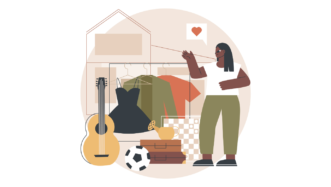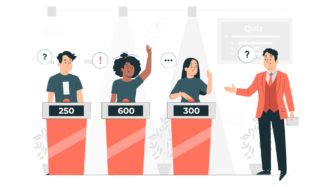LESSON OVERVIEW
With this lesson plan students learn how to use indefinite pronouns and get the opportunity to put them into practice through a series of written and oral exercises.
WARM UP & INDEFINITE PRONOUNS
The warm-up includes seven riddles which students try to solve in pairs. When the answers are clear, they decide which riddle is the cleverest. Then, students read the riddles again and underline all indefinite pronouns in them. They also have to determine if the pronouns beginning with no-, some-, any- and every- are used in questions, affirmative or negative sentences. After that, they’re ready to complete six rules about the use of indefinite pronouns.
WRITTEN PRACTICE
The second part of the lesson is all about putting the rules into practice through a series of written and oral exercises. In the first one, students need to correct mistakes in nine sentences. Then, they read the sentences again and try to guess who said them and in what situation. In the following exercise, students look at a picture, read its short description and complete the gaps with the correct indefinite pronouns. They move on to another picture with a corresponding gapped description. This time indefinite pronouns are given in the text and students’ task is to complete it with the correct forms of the verbs in brackets. Both exercises prepare students for the next, oral activity.
ORAL PRACTICE
First, students work in pairs and look at three pictures and a box with indefinite pronouns. Using as many pronouns from the box as possible, students describe the pictures. The aim of the next task is for each student to finish seven half sentences with indefinite pronouns, so they are true for them (e.g. Nothing on my desk is…). Then, students try to check how much they have in common with their partners. They come up with questions they could ask their classmates to see if the sentences from the previous exercise are also true for them. The lesson finishes with a role play. Students act out the situations given on role play cards. They have to incorporate the indefinite pronouns indicated in the instructions. We’ve prepared two sets of role play cards for students to use.













Simply great!
Thank you 🙂
Some good laughs…a lot of fun. Thank you!
That’s great to hear, thanks!
I’m excited to use it with my students. Thanks a bunch!
Thank you. Hope your students like the lesson 🙂
hi looking forward to teaching this. can you help me with the affirmative negative bit… not sure how to explain it to the students as I dont fully Understand it,
Thanks
Hi! Pronouns starting with no-, some- and every- can be used in affirmative sentences, and those starting with any- and every- can be used in negatives and in questions. Plus some exceptions are listed under the table 🙂
Could we go anywhere (somewhere) sunny?
How is this sentence possible if we cannot use some- in questions. I’m missing the explanation for this.
Thanks! Love your content
Hi! Thanks! Regarding your question: the explanation is provided in ex. 3, item e (slides 12-13, item E) and it is that some- can be used in questions which are polite offers or requests.
Thanks! I dont see that e lesson plan as I have the free plan, and its not mentioned in the teachers plan. Thanks for letting me know!
No problem! It is there though, in the student’s and teacher’s pdf. It’s exercise 3, rule e). The rule reads: ‘Some’ can be used in questions, e.g. ‘Would you like something to eat?’ or ‘Could I have something to drink?’ which are polite offers or requests.